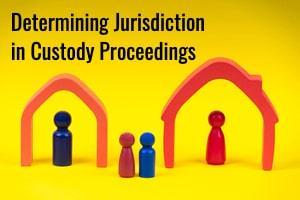Dealing With Interstate Child Custody Issues: Part One -- Determining Jurisdiction for Initial Custody Proceedings
 When two parents get divorced or are no longer in a romantic relationship, it is not uncommon for one or both parents to make other life changes, such as relocating. While a fresh start can be a good change for the parents, this can complicate proceedings for child custody. Any proceeding that concerns parenting time and/or decision-making responsibilities for the child must be filed with the correct court. In this series of blogs, we will discuss the Uniform Child Custody Jurisdiction and Enforcement Act (UCCJEA) and how it is used to settle interstate child custody issues. Simply because a parent has moved does not mean that the parent’s new location is the place to file custody proceedings. In most cases that involve parents living in different states, the first thing you will have to do is determine which state has jurisdiction over your case.
When two parents get divorced or are no longer in a romantic relationship, it is not uncommon for one or both parents to make other life changes, such as relocating. While a fresh start can be a good change for the parents, this can complicate proceedings for child custody. Any proceeding that concerns parenting time and/or decision-making responsibilities for the child must be filed with the correct court. In this series of blogs, we will discuss the Uniform Child Custody Jurisdiction and Enforcement Act (UCCJEA) and how it is used to settle interstate child custody issues. Simply because a parent has moved does not mean that the parent’s new location is the place to file custody proceedings. In most cases that involve parents living in different states, the first thing you will have to do is determine which state has jurisdiction over your case.
Initial Jurisdiction in Illinois
When parents live in two different states, it may not be clear-cut as to which state has jurisdiction over the case. Thankfully, the UCCJEA exists to help clear up any confusion that may exist and to provide guidelines as to how to determine jurisdictional appropriateness. Before a court can make any decisions pertaining to a custody case, they must first determine if the case is being heard in the right jurisdiction. The UCCJEA states that the case can only be heard in Illinois if:
-
Illinois is the home state of the child, meaning the child lived in Illinois for six months immediately prior to the proceedings
-
Another court in a different state does not have jurisdiction under the “home state” rule, or a court declined jurisdiction and at least one parent of the child has a significant connection with Illinois and substantive evidence is available in the state
-
All courts that potentially have jurisdiction over the case have declined or deferred jurisdiction
The Golden “Home State” Rule
In most cases, the most important factor when determining jurisdiction is the child’s home state. The UCCJEA gives priority to the child’s home state when determining which court should hear a custody case. The home state rule is applicable first and foremost in all child custody proceedings, meaning the only time a case can be commenced in a state other than the child’s home state is when the child does not have a home state, or if the state declines jurisdiction. These exceptions will be discussed in Part Two of this blog series.
Contact a Batavia, IL Child Custody Attorney Today
Most states follow the UCCJEA, which makes it much easier when attempting to determine which court has jurisdiction over your child custody case. At the Law Office of Matthew M. Williams, P.C., we can help you with any child custody issue you may be facing, including determining which court has jurisdiction over your case. To schedule a consultation with our knowledgeable DuPage County child custody lawyer, call our office today at 630-409-8184.
Sources:
https://ilga.gov/legislation/ilcs/ilcs5.asp?ActID=2497&ChapterID=59
https://www.ojp.gov/pdffiles1/ojjdp/189181.pdf









